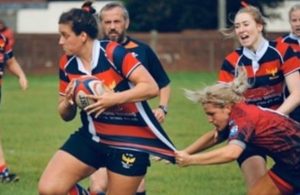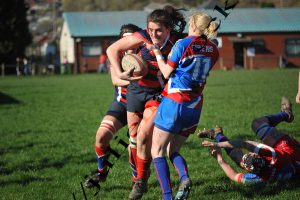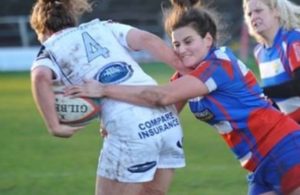History Makers: Emily Hughes and Head Coach Craig Taylor on Wales’ First Women’s International Rugby League Team
Wales will play their first ever Women’s Rugby League international against England in November.
One of the biggest challenges facing the women’s side will be similar to one their male counterparts have faced for years. How can they compete in a country dominated so heavily by Union.
Nobody represents this challenge better than squad member Emily Hughes. Sports Gazette spoke to Hughes and Head Coach, Craig Taylor, about their stories and the challenges ahead.
After her first-year playing Union at the University of Leicester she was scouted to represent former English Premiership power house Litchfield.
Since then she has gone from strength to strength within the game, playing her most recent rugby with Welsh Premiership side, Pencoed Pheonix.
It was whilst she was training with Pencoed that Hughes decided to give Rugby League a go earlier this year, attending training sessions with the Cardiff Dragons and Rhondda Outlaws.
Now she finds herself on the cusp of realising a lifelong dream as part of the inaugrual Welsh International Women’s Rugby League team.

Speaking about her inclusion in the 24 women squad Hughes said: “To be a Welsh International player and to be part of the first ever Welsh Women’s Rugby League team is such an honour. I feel privileged to be part of a growing sport.
“My first goal is to get my welsh cap that would be amazing. Generally, I want to grow as a rugby league athlete by increasing my knowledge of the sport and trying to improve each game.”
Despite a large cross over of skills Rugby League and Union are two very different sports and as some of the most talented male international dual code players have found out the transition between both sports is not an easy one.
Hughes summed this up “I’ve played as a forward in rugby union for five years, so my mind automatically tells me to get involved in rucks and tackle low. I’m learning slowly that this is not the case in league.”

With so many of the squad coming from a Union background there is a lot of pressure on the coaching staff to deliver the fundamentals in a short period of time.
Hughes said: “As the coaches understand that a lot of us are from a union background they’ve been great at breaking each part of the game down and highlighting the changes we need to make.”
The coaching staff is headed up by Craig Taylor. Taylor has 17 years’ experience coaching in the sport and for the last eight years that has been predominantly with the female game.
He has been responsible for developing Women’s and Girls’ programmes for the Rugby Football League (RFL). As someone who has coached both League and Union, Taylor is the ideal fit to manage this transition.
“I feel extremely privileged to be leading the first ever women’s elite program. There is a lot of excitement around the squad announcement, with an amazing amount of views and shares on social media. In the contact time I’ve had the girls have been brilliant. Already it feels like we are putting solid foundations in place for the future.”
“Rugby League is obviously behind Rugby Union in terms of popularity and funding. However, they are two very different sports,” Taylor told the Sports Gazette.
With regards to how the girls have been adapting to the game, Taylor has been very impressed.
“They love rugby league the speed of the game, the amount of time with ball in hand and how much tackling they get through. There has been a lot of interest in the announcement of this team and I only see both the women’s & men’s games growing.”
Hughes’ Union background is no exception, the squad is led by captain Rafiuke Taylor who will become Wales’ first women’s dual-code international if she gets a cap next month. Taylor was capped six times for the Union side between 2013 and 2014.
“Rafiuke is an extremely talented athlete with a real champion attitude,” said Taylor.
“In future, I am not sure if there will be more duel code internationals. I can see more Sevens players coming into the league setup, but time will tell on that one.”
For now, at least a lot of the squad, including Hughes, are able to balance their Union with their League but Taylor thinks that ultimately it will get to a point when the girls have to choose between codes.
This is something that will occur in coherence with the growth of the league game in Wales. The more popular the sport becomes the less dual code players will be needed.
“Growth will happen through exposure. Rugby league in my view is the best team sport in the world. I say that as a coach that has also coached rugby union. The more positive exposure rugby league gets the bigger it will become.” Taylor told the Sports Gazette.

One way of growing the sport is by having role models for young people to aspire to, something which has not been there for the likes of Hughes. This is something she hopes she can one day provide young girls with.
“At the moment I’m just going to focus on reaching my potential within the Welsh Rugby League team but I would love to become a role model for young girls that are aspiring to play rugby for Wales,” Hughes said.
Wales warm up against Great Britain Teachers is on 26 October in Neath, before they embark on a new chapter at Leigh on 16 November.
With regards to the sides first two international fixtures Taylor said: “Both will be tough games playing against opposition that have been playing rugby league from being children.”
Whatever the outcome of the results the journey Hughes, Taylor and the rest of the squad are about to begin is compelling.